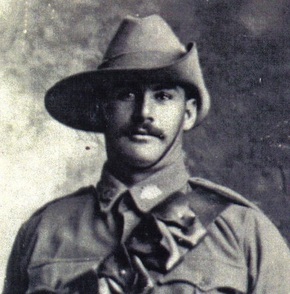George Herbert Puckett
GEORGE HERBERT PUCKETT (1888-1944) born at Yass, son of John and Edith Puckett nee Davis. George enlisted in the First Light Horse as Driver No.53 on August 19th, 1914.He had 6 years service with 2nd Infantry Battalion Volunteeers George and his cousin Roy Davis were among the first Yass men to enlist. When the Yass townspeople discovered that he had no horse of his own to take with him, Mr. M. Nash purchased one for him at the cost of £18, placed the receipt on a table at the farewell function and a subscription was quickly taken up so that the horse became a gift from everyone. The surplus funds were given to George. In the speeches, songs and recitations which followed, glorifying the empire, and Australia's role in it, Mr. R. Bracken offered a stanza of Byron's Bridge of Sighs:-
Breathes there a man with a soul so dead
Who never to himself hath said,
This is my own, my native country.
Training and medical examination were undertaken at Roseberry Park in Sydney. He embarked on the HMAT A16 Star of Victoria at Sydney on October 10th, 1914. George drove a horse team pulling a machine gun. George served in Egypt and Gallipoli where he was wounded in the right arm on May 23rd. He had written home about that time,
There is a possibility that I may return home again, but you know what that means. But I will do my best, and with God's help, may come through all right. I hope so anyway. I
am writing this on the butt on of my rifle, and we are living on biscuits and tinned meats and bacon, with a few dried vegetables. But we have plenty. We have not seen bread for a fortnight, but we are satisfied with what we have got. We have been lucky so far --- but fellows are warming the Turks up! This is all the news at present.
Trooper Puckett had been trained as a driver of a horse team pulling a machine gun, but this was not a part of the Gallipoli campaign, however he was sent there on May 9th. He performed nightly patrol with Trooper Frederick Wood as a pair of sharp shooters. They became great mates but suffered a terrible ordeal on the night in June 1915, when both were shot at Gaba Tepe while moving through the notorious Monash Valley between The Nek and Pope's Hill on the Gallipoli Peninsula. They were working in pairs as sharpshooters on a night patrol. One shot rang out and both fell. Herb was wounded in the right arm, Fred in the right thigh - both swearing that it was the one bullet. News of the incident was forwarded by Colonel Harry Chauvel and a telegram sent home to Newton Valley. Both were sent to No.1 General Hospital (50 days – wound became septic) in Cairo for operations before being repatriated from Suez to Australia on board the Honorata and discharged Medically Unfit on January 19th, 1916. The medical board had expressed an opinion that he might be able to regain fitness and return to active service and granted paid leave for two months and massage treatment to facilitate the improvement to the ulna nerve damage in his arm. He remained a life-long friend of Frederick Wood. He embarked for his return home to Newton Valley on July 29th, 1916. He was allocated a pension of £1 per fortnight which was later amended to 15/6d per fortnight from March 15th, 1917. Awarded the 1914-15 Star, British War Medal and the Victory Medal
Then during WW2 he saw a need to serve his country again. He enlisted in the Volunteer Defence Corps as Private N377168 on March 27th, 1942. [Davis of Gounyan Family Roll of Honour - BM Pittman]
Submitted 2 May 2015
by Beryl Pittman












